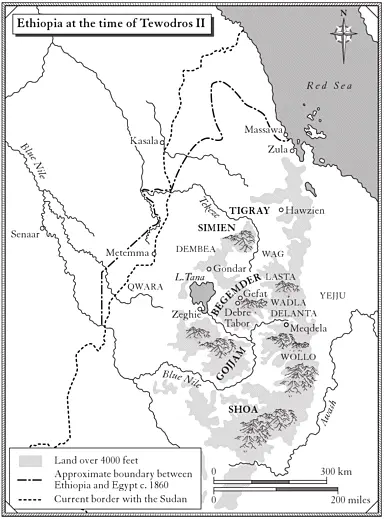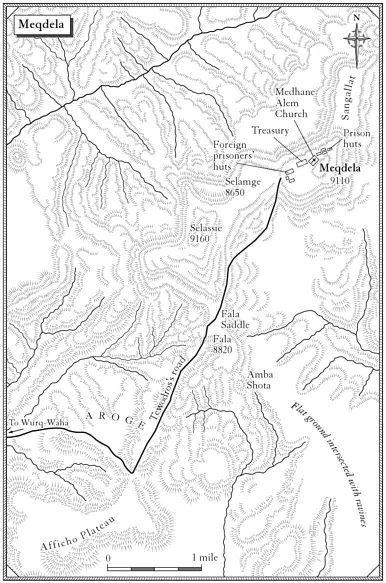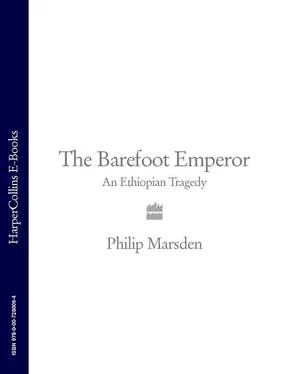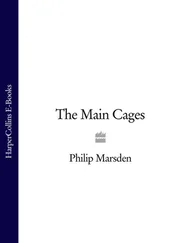An Ethiopian Tragedy
PHILIP MARSDEN
To Clio
Maps: Ethiopia at the time of Tewodros II |
|
Meqdela |
|
Author’s Note AUTHOR’S NOTE For the purposes of the story, the names ‘Ethiopia’ and ‘Abyssinia’ can be seen as interchangeable. I have used Ethiopia in the text, but have not changed Abyssinia where it appears in quoted material. A degree of revisionist spelling has been necessary to rid Ethiopian places and people of their Eurocentric tarnish – thus Magdala becomes Meqdela, Theodore, Tewodros (pronounced with a silent ‘w’– Te-odros ). Over the years, many hundreds of people have contributed to my own understanding of Ethiopia, its people and its past – monks and farmers, scholars and patriots, politicians and painters, all too numerous to mention. But for the Tewodros story particular thanks are due to: Professor Richard Pankhurst, for his encouragement, for digging out references and notes; the historian Shiferaw Bekele of Addis Ababa University, for his time and his clear-sighted view of Tewodros and his legacy; Dr Mandefro Belayneh for his enthusiasm; Hiluf Berhe, as always a tireless walker and perfect companion, for his help in Bahir Dar, Debre Tabor, Meqdela, and for translating the Chronicles of Zeneb; Kidame of the town of Kon, who came with us to Meqdela with his donkeys, for his fighting off of the hyenas that night in the valley of Wurq-Waha; Tony Hickey, for equipment; Sandy Holt-Wilson, an eye surgeon who has gathered together an archive of Tewodros’s son, Alemayehu Tewodros, and lectures about him to raise money for an eye unit at Gondar University (www. Gondar Eye Site. com); Jean Southon, great-niece of Captain Speedy, who allowed me to see family papers; Colonel Damtew Kassa and his cousins, direct descendants of Tewodros; HE Bob Dewar, British Ambassador to Ethiopia; the Scholarship Committee of the Harold Hyam Wingate Foundation; Susi Rech for translation of the German of Flad and Waldmeier; Will Hobson for his multilingual skills; Roland Chambers for help with Ransome references; Dr Iain Robertson Smith, Colin Thubron, Gillon Aitken, Mike Fishwick, Richard Johnson and Robert Lacey for their support; and Charlotte, whose judgements have greatly improved what follows and whose tireless enthusiasm made producing it so enjoyable. |
|
| Glossary |
|
| Prologue |
|
| THE BAREFOOT EMPEROR |
|
| Notes |
|
| Bibliography |
|


For the purposes of the story, the names ‘Ethiopia’ and ‘Abyssinia’ can be seen as interchangeable. I have used Ethiopia in the text, but have not changed Abyssinia where it appears in quoted material. A degree of revisionist spelling has been necessary to rid Ethiopian places and people of their Eurocentric tarnish – thus Magdala becomes Meqdela, Theodore, Tewodros (pronounced with a silent ‘w’– Te-odros ).
Over the years, many hundreds of people have contributed to my own understanding of Ethiopia, its people and its past – monks and farmers, scholars and patriots, politicians and painters, all too numerous to mention. But for the Tewodros story particular thanks are due to: Professor Richard Pankhurst, for his encouragement, for digging out references and notes; the historian Shiferaw Bekele of Addis Ababa University, for his time and his clear-sighted view of Tewodros and his legacy; Dr Mandefro Belayneh for his enthusiasm; Hiluf Berhe, as always a tireless walker and perfect companion, for his help in Bahir Dar, Debre Tabor, Meqdela, and for translating the Chronicles of Zeneb; Kidame of the town of Kon, who came with us to Meqdela with his donkeys, for his fighting off of the hyenas that night in the valley of Wurq-Waha; Tony Hickey, for equipment; Sandy Holt-Wilson, an eye surgeon who has gathered together an archive of Tewodros’s son, Alemayehu Tewodros, and lectures about him to raise money for an eye unit at Gondar University (www. Gondar Eye Site. com); Jean Southon, great-niece of Captain Speedy, who allowed me to see family papers; Colonel Damtew Kassa and his cousins, direct descendants of Tewodros; HE Bob Dewar, British Ambassador to Ethiopia; the Scholarship Committee of the Harold Hyam Wingate Foundation; Susi Rech for translation of the German of Flad and Waldmeier; Will Hobson for his multilingual skills; Roland Chambers for help with Ransome references; Dr Iain Robertson Smith, Colin Thubron, Gillon Aitken, Mike Fishwick, Richard Johnson and Robert Lacey for their support; and Charlotte, whose judgements have greatly improved what follows and whose tireless enthusiasm made producing it so enjoyable.
abet – a greeting call, used to attract attention, or to acknowledge such a call
abun, abune – the head of the Ethiopian Orthodox Church, at this time always a Copt
adarash – meeting hall
afe-negus – literally ‘mouth of the king’, royal spokesman
aleqa – chief or head
alga – bed, wooden-framed and sprung with a lattice of leather straps; also means throne
amba – a flat-topped mountain peak, often surrounded by cliffs, a natural fortress or isolated site for a monastic community
ato – Mister
Ayzore! – ‘Be strong!’ Comradely call of encouragement in battle, travel or labour
azmari – minstrel, composer and singer of witty verses, accompanied by masenqo, single-stringed fiddle
balderada – a chaperon and translator appointed to assist foreign visitors at the Ethiopian court
basha – from the Turkish ‘pasha’, used for high officials, and with irony in the case of Captain Speedy (‘Basha Felika’)
belg – the ‘small’ rains, usually occurring between late January and early March
bitwedded – ‘favourite’, court title, used often as qualifier to other titles like ras
debtera – a non-ordained rank of the Ethiopian Church, responsible for singing and dancing, and often possessed of peripheral religious powers, as herbalist and spell-maker
dejazmach – literally ‘commander of the gate’, a military and noble rank just below ras
doomfata –the recital of heroic deeds
falasha –an Ethiopian Jew
farenj –foreigner (adjectival form – farenji )
Fekkare Iyesus – The Interpretation of Jesus , Ethiopian sacred text
Fetha Negest – ‘laws of the kings’, the book of Ethiopian law
fitawrari – ‘commander of the front’or ‘vanguard’
Galla –former name of the Oromo people, originally pastoralists from the southern and eastern highlands
giraf –hippo-hide whip
godjo –stone-built hut typical of Tigray and the north of Ethiopia
grazmach –literally ‘leader of the left’, military and noble rank below dejazmach
gugs –a game of mock combat, involving two teams of horsemen charging each other: beautiful to watch, hazardous to play
Habesh –the name Ethiopians often use for themselves, from the Arabic ‘mixed’, and the basis of the name ‘Abyssinia’
Читать дальше














